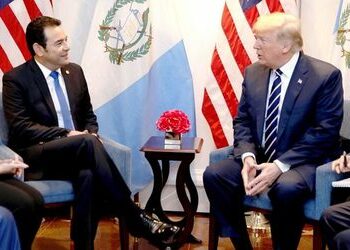In late March, President Donald Trump followed up on his threat to suspend US aid to El Salvador, Honduras and Guatemala. He had repeatedly made this pledge, stating that these countries had accepted aid from Washington without any success in stopping migration and drug trafficking.
The aid packages to these countries were substantial. In the 2017 fiscal year, Congress allocated $657.4 million to these countries, which was lowered to $615 million for 2018 and $527.6 million for 2019. In 2016 and 2017, around half of these funds went to supporting programs on public safety, justice systems, violence prevention, transparency and good governance, all related to fighting crime in the region, according to the Washington Office for Latin America (WOLA). Trump partially walked back this decision in May, stating that aid to police would be maintained.
SEE ALSO: US Corruption List Highlights Northern Triangle Presidents’ Criminal Ties
Two months on, a legislative source in Washington, who spoke on condition of anonymity as they were not authorized to reveal internal deliberations in Congress, told InSight Crime that US embassies in El Salvador, Honduras and Guatemala have also been told not to commit any aid money that has not been spent from the 2017 and 2018 budgets.
“Washington is even reviewing contracts that have already been signed to determine if it is more expensive to break them than to continue them,” said the source. “The decision on 2018 funds is not to commit any money, so many believe that that has already been lost.”
But a second legislative source confirmed that lawmakers from both parties who oppose the administration’s measure are working on new language that would “make it more difficult” for the administration not to spend the money allocated for 2019 and projected for in 2020.
Here are five ways in which the cuts will make things worse:
1. The Fight Against Corruption
US money has served to strengthen specialized criminal investigation units in the three countries. In the cases of Honduras and El Salvador, the programs aimed at improving transparency in the judicial sectors were well funded in 2017, according to WOLA, with around $22 million in each nation. In El Salvador, US money awarded between 2015 and 2017 helped improve the capabilities of an anti-impunity task force in the Attorney General’s Office and the Supreme Court, where criminal investigations prosecuted two former presidents for corruption and embezzlement.
2. The Prevention of Youth Violence
A good percentage of the resources allocated in 2017 went to violence prevention programs: around $47 million dollars to El Salvador and about $33 million to Honduras. In El Salvador, this financial support was vital in launching the prevention element of El Salvador’s ‘Plan Seguro’ in communities dominated by the MS13 and Barrio 18 gangs.
SEE ALSO: Guatemala President Causes Constitutional Crisis to Oust CICIG
3. Combating Political and Criminal Mafias
In Guatemala, US financial assistance was vital in showing support for the International Commission Against Impunity in Guatemala (Comisión Internacional Contra la Impunidad en Guatemala – CICIG). But funding has decreased since 2017. The work of CICIG, along with the Attorney General’s Office, has been essential for the Guatemalan justice system to prosecute organized political and criminal elements in the government. In El Salvador, the United States has contributed nearly $10 million to create a telephone intervention center controlled by the Attorney General’s Office, which has been essential in investigating complex crimes involving political and business elites and drug trafficking groups.
4. The Empowerment of Criminal Gangs
US President Donald Trump’s administration has vacilatted between supporting anti-corruption efforts and the fight against organized crime and the backing for political regimes who are accused of facilitating corruption and drug trafficking, such as the administrations of Guatemalan President Jimmy Morales and Honduran President Juan Orlando Hernández. The Honduran case is a strong example: Washington gave Hernández a political lifeline when he faced strong doubts about the legality of his re-election, but US prosecutors have also pursued cases into members of Hernández’s inner circle and former president Porfirio Lobo. It is not clear how Washington will handle the increasing tension circling Hernández as he remains one of its main allies in the region.
5. The Fight Against Drug Trafficking
The case of Honduras best illustrates this. About 15 percent of the aid granted in 2017 by the United States to the region went to anti-drug activities, with Honduras receiving the most money in this category. Investigations by InSight Crime in major areas of narco-activity in Honduras, such as Olancho and Gracias a Dios on the border with Nicaragua, revealed that a Honduran army task force, advised and equipped in part by the Drug Enforcement Administration (DEA), had reduced its operations in mountainous and coastal areas of northeastern Honduras. In recent months, activity at clandestine airstrips and drug shipments by boat have risen in these areas and in southern Honduras, which borders El Salvador.

